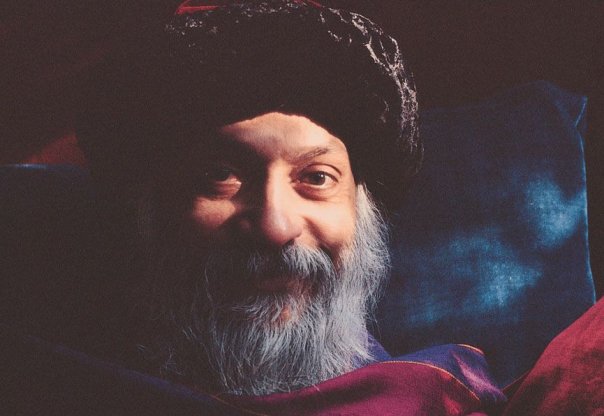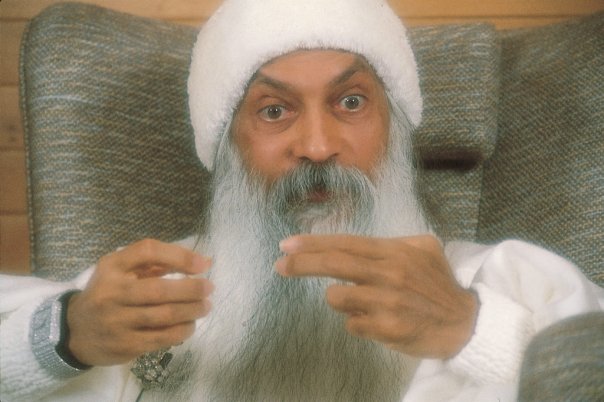Citazioni di Osho sull'aggrapparsi
- A real sannyasin cannot claim any ownership. Un sannyasin significa colui che ha lasciato tutti i beni, o tutta la possessività, che è più profondo e più elementare. Puoi lasciare dei beni, questo è facile; but to leave possessiveness is difficult because it goes deeper in the mind. You can leave the world, but the mind goes on clinging to it.
- Non aggrapparti a nulla. L'attaccamento è la causa del nostro essere inconsci. Se inizi a rilassarti, dentro di te accadrà un tremendo rilascio di energia. E quell'energia che era coinvolta nell'aggrapparsi alle cose porterà una nuova alba al tuo essere, una nuova luce, una nuova comprensione, un tremendo alleggerimento - nessuna possibilità di alcuna infelicità, agonia, angoscia.
- Aggrappandosi a qualsiasi cosa, qualsiasi cosa, mostra diffidenza. Se ami una donna o un uomo, e tu ti aggrappi, questo dimostra semplicemente che non ti fidi.
- Cling to anything and the mind is back, because clinging is mind. Hold on to anything, depend on anything, and the mind is back, because the mind is dependence, schiavitù. Possess anything — even a spiritual method, even a method of meditation — become a possessor, and you are possessed by it. Whether you possess money or you possess a tremendously significant method of meditation, non importa. Whatsoever you possess, you will be possessed by it and you will be afraid to lose it.
- When you don’t cling to the mind you can use it in a far better, far more efficient way, because the energy that was involved in clinging becomes available. And when you are not continuously in the mind, twenty-four hours a day in the mind, the mind also gets a little time to rest.
- The present is fleeing every moment …what is the point of clinging? Clinging will bring you misery.
- Only this eternal awareness can be the true home, nient'altro, because everything else is a flux. And we go on clinging to the changing; then we create misery, because it changes and we want it not to change. We are asking for the impossible, and because the impossible cannot happen we fall into misery again and again.
- Religione, come tale, is surrendering, rilassante. Non aggrapparti a nulla. Clinging shows that you don’t trust life. Every evening, Mohammed used to distribute whatsoever he had collected in the day. All! Not even a single pai would he save for the tomorrow because he said that the same source that had given today, would give to him tomorrow. If it has happened today, why be untrusting about tomorrow? Why save?
- Ricordare: no attachment should grow, no clinging should grow. They are all against your independence, la tua libertà, la tua individualità.
- Un bambino non è consapevole. Un bambino vive in una profonda incoscienza. Diventando consapevoli stai diventando adulto, maturo, Quindi tutto ciò che si aggrappava alla tua incoscienza scomparirà. Proprio come porti luce in una stanza e l'oscurità scompare; Porta la coscienza in profondità nel tuo cuore.
- The moment you become miserly you are closed to the basic phenomenon of life: expansion, condivisione. The moment you start clinging to things, you have missed the target – you have missed. Because things are not the target, tu, your innermost being, is the target – not a beautiful house, but a beautiful you; not much money, but a rich you; not many things, but an open being, available to millions of things.
- A miser misses tremendously. Because life is for those who share, life is for those who love, life is for those who are not too clinging to things — because then they become available to persons. To cling to a thing is to cling to something which is below you. And if you go on clinging to things which are below you, how can you soar high? It is as if you are clinging to rocks and trying to fly in the sky. Or you are carrying rocks on the head and trying to climb Everest. You have to throw them. You have to throw those rocks. You will have to unburden yourself.
- The heart of knowing is now. Knowledge is always of the past. Knowledge means memory. Knowledge means you have known something, you have experienced something, and you have accumulated your experience. Knowing is of the present. And how can you be in the present if you are clinging too much to knowledge? That is impossible; you will have to drop clinging to knowledge. And knowledge is acquired: knowing is your nature. Knowing is always now — the heart of knowing is now.
- Bisogna essere spontanei. Bisogna vivere momento per momento, né pensando al passato, né pensare al futuro, né aggrapparsi al presente.
- Aggrapparsi al conosciuto è aggrapparsi a un cadavere. Non occorre coraggio per abbandonare l'attaccamento; ci vuole infatti coraggio per continuare ad aggrapparsi a un cadavere. You just have to see… That which is familiar to you, which you have lived — what has it given? Dove sei arrivato? Non sei ancora vuoto? Non c'è un immenso malcontento, una profonda frustrazione e mancanza di significato? In qualche modo continui a gestire, nascondere la verità e creare bugie per rimanere fidanzati, coinvolti.
- One has to be very alert about dropping the method. Once you attain something, immediately drop the method, otherwise your mind will start clinging to the method. It will talk very logically to you, detto, “It is the method that is important.”
- Una cosa fondamentale del suicidio è che si manifesta solo nelle persone che si aggrappano molto alla vita. E quando falliscono nel loro aggrapparsi, la mente si sposta al polo opposto. La funzione della mente è di uno/o: o vuole il tutto, o niente di tutto questo. La brama di vivere non può essere soddisfatta totalmente, perché la vita in quanto tale è una cosa temporale; è destinato a finire in un punto, proprio come è iniziato un giorno a un certo punto. Non puoi avere una linea con solo l'inizio; da qualche parte ci sarà sicuramente una fine.
- L'indifferenza sembra distacco, ma non è; l'indifferenza non è semplicemente interesse. Detachment is not absence of interest — detachment is absolute interest, enorme interesse, ma ancora con la capacità di non aggrapparsi. Goditi il momento mentre è lì e quando il momento inizia a scomparire, poiché tutto è destinato a scomparire, Lasciarlo andare. Questo è il distacco.
- Surrender is the highest form of love, la forma più pura dell'amore. You will not feel dependent, because there will be no clinging in it. You will not feel dependent, because it is not out of loneliness that you have surrendered. If you have surrendered out of loneliness then it is not surrender at all, then it is something else.
- As time changes, rights change, wrongs change. And you can see it in your own life — every day things are different, and you go on clinging to your fixed ideas. The man who lives with fixed ideas lives a dead life. He is never spontaneous and he is never in a right relationship with the situation that exists. He is never response-able; he functions out of his old conclusions which are no longer relevant, he does not look at the situation itself.
- Make your life an aesthetic experience. And not much is needed to make it an aesthetic experience; just an aesthetic consciousness is needed, a sensitive soul. Become more sensitive, more sensuous, and you will become more spiritual. Priests have almost poisoned your body into a state of death. You are carrying paralyzed bodies and paralyzed minds and paralyzed souls — you are moving on crutches. Throw away all those crutches! Even if you have to fall and crawl on the ground, that is better than clinging to crutches.
- The past has to die. We have to drop our clinging with the past. What does it mean when you say that “I am a Hindu”? It means you cling to a certain past tradition. What do you mean when you say that “I am a Mohammedan”? You cling to something past.



lovely post!!!